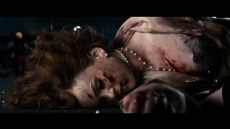
The incorporation of Tom acting violently towards Myrtle, does initially create a strong sense of sympathy towards her; ‘Making a short deft movement, Tom Buchanan broke her nose with his open hand.’ The violence is a stereotypical way to present someone as a victim, which is why it is particularly clever, as it is easy to say that Myrtle must be a victim, as she has been hurt so badly. Some readers may feel that Myrtle provoked Tom to such an extent that she almost brought it upon herself, as she repeatedly heckles Tom by shouting his wife’s name; ‘I’ll say it whenever I want to! Daisy! Dai-‘ This shows Myrtle as being quite callous and cruel, by mentioning Daisy, when Tom evidently does not want to talk about her, as it isn’t very appropriate when he is at a party with Myrtle, rather than his wife. It could be said that Tom is victimised here, and the reader may feel sympathy towards him temporarily, as he probably isn’t happy in his marriage, otherwise he wouldn’t have a mistress. Equally, it could be argued that no matter what Myrtle has done, she does not deserve to be abused. The fact that the other guests do not even talk about this incident, shows a distressingly casual attitude towards domestic violence, which might shock contemporary readers, and create sympathy towards Myrtle. Also, this is yet another instance in which we see the picture that Fitzgerald has painted between alcohol and violence, subtly inferring that alcohol often leads to violence. Perhaps this is in part due to Fitzgerald’s own troubled life and his struggle with alcoholism.
In conclusion, Myrtle is presented as a sympathetic character to some degree as, she lives in a terrible environment, is very unhappy with her marriage, much like Tom, and is clearly under an immense amount of pressure to fulfil the role of trophy girlfriend for Tom, whilst dealing with the negative impressions people have of her for being a mistress. However, she herself manipulates Tom for her own advantage, and may only be with him to attain a life of luxury. Overall, I think Fitzgerald portrays her in a balanced way, but maybe more sympathetically inclined, especially when viewed by women, as she is a relatable character to most if not all women. I think by including both aspects of her character, Myrtle gains multiple dimensions, ultimately becoming a much more realistic and memorable character. Also, nearing the end of the novel, we see Myrtle’s untimely death as a result of drink-driving – another inference of the dangerous effects of alcohol from Fitzgerald – and as such, how can we as readers feel anything other than sympathy when this poor woman has spent her entire life feeling insecure and inferior, being the object of hatred and disgust of many, has now had her life snatched away without any sense of resolution or happiness being achieved. As such, overall, Myrtle’s character is utterly tragic, and undeniably creates a strong sense of sympathy from any audience.
Image: https://www.youtube.com/watch?v=5xQqqokknMo

0 Comment:
Be the first one to comment on this article.